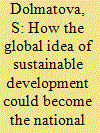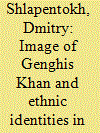| Srl | Item |
| 1 |
ID:
131864


|
|
|
|
|
| Publication |
2014.
|
| Summary/Abstract |
HALF A DECADE has passed since the beginning of the global financial and economic recession in 2008. In this period, significant events have taken place and important trends have emerged, making it possible to review the preliminary results. This is being done not only by researchers and experts, but also at high-level social and political forums.
|
|
|
|
|
|
|
|
|
|
|
|
|
|
|
|
| 2 |
ID:
092408


|
|
|
|
|
| Publication |
2009.
|
| Summary/Abstract |
The recent rise of Asia as a global geopolitical center has led to renewed interest in Asian history, not just by Asians but by Europeans as well. Genghis Khan is one of those figures who attracts attention, and several movies on him have recently been created. One of them was made in Russia and has led to broad public response. These responses have made it possible to gauge the views of the Russian public on the role of Russia in the global community and the relationship between Russians and ethnic minorities of the Russian Federation.
|
|
|
|
|
|
|
|
|
|
|
|
|
|
|
|
| 3 |
ID:
110442


|
|
|
|
|
| Publication |
2012.
|
| Summary/Abstract |
In post-Soviet Russia, changing migration patterns have led to the formation of Muslim communities in new regions, and to increased contacts between Russian and foreign Muslims. This article examines two Russian regions, Belgorod Oblast' and the Republic of Adygeya, in which such post-Soviet mobility is causing political conflicts over the governance and rights of Muslim communities. In Belgorod, regional authorities have blocked construction of a mosque for a new Muslim community. In Adygeya, authorities are seeking to restrict foreign influences on local Muslims. In both regions, officials still operate on the outdated Soviet assumption that they can contain the mobility of Islam.
|
|
|
|
|
|
|
|
|
|
|
|
|
|
|
|
| 4 |
ID:
111021


|
|
|
|
|
| Publication |
2011.
|
| Summary/Abstract |
Yelena Biberman discusses the causes and implications of the diplomatic drain since the early 1990s-inside the Russian Ministry of Foreign Affairs. Drawing on an original survey of students at academic programs in elite Russian universities designed to train diplomats, she challenges the idea that inadequate material benefits limit interest in Russian diplomatic careers. Instead, she demonstrates that concerns over the relative power and prestige of the diplomatic corps guide prospective diplomats in their career choices.
|
|
|
|
|
|
|
|
|
|
|
|
|
|
|
|
| 5 |
ID:
088834


|
|
|
| 6 |
ID:
112157


|
|
|
|
|
| Publication |
2012.
|
| Summary/Abstract |
This essay argues that, although it is tempting to view Russian policies through a revived Cold War paradigm, this is a problematic and ultimately misguided approach. Such an approach ignores the significant sources of discontinuity and rupture between the Soviet Union and post-Soviet Russia. The essay presents an alternative framework for understanding and conceptualising Russia's engagement with the Middle East. This has three dimensions and takes an 'inside-out' approach. First, there are the domestic drivers for Russian engagement which is linked to the perceived need to counter the threat of secessionism in the North Caucasus and the potential broader radicalisation of Russia's Muslim population. Second, there are the more strictly economic interests in the Middle East, which include increasingly important trading relations with moderate pro-Western states in the region. And, third, there are the geopolitical considerations which certainly include potential competition with the West but also incorporate Russian ambitions to promote its credentials as a responsible great power supporting international norms, such as the principle of non-proliferation and a settlement of the Arab-Israeli conflict. The tension and conflict between these two strands of Russian policy making have been notably present in Moscow's responses to the Arab Spring.
|
|
|
|
|
|
|
|
|
|
|
|
|
|
|
|
| 7 |
ID:
103207


|
|
|
|
|
| Publication |
2011.
|
| Summary/Abstract |
This article surveys nation-building efforts in post-Soviet Russia. There have been five main nation-building projects reflecting the dominant ways of imagining the 'true' Russian nation but each has been fraught with contradictions and therefore have been unable to easily guide state policies. At the same time, a solution to the Russian nation-building dilemma may be emerging. This solution does not resolve the contradictions associated with each of the nation-building agendas but instead legalises the ambiguous definition of the nation's boundaries in the 1999 law on compatriots and the 2010 amendments to it. The fuzzy definition of compatriots in the law allows Russia to pursue a variety of objectives and to target a variety of groups without solving the contradictions of existing nation-building discourses.
|
|
|
|
|
|
|
|
|
|
|
|
|
|
|
|